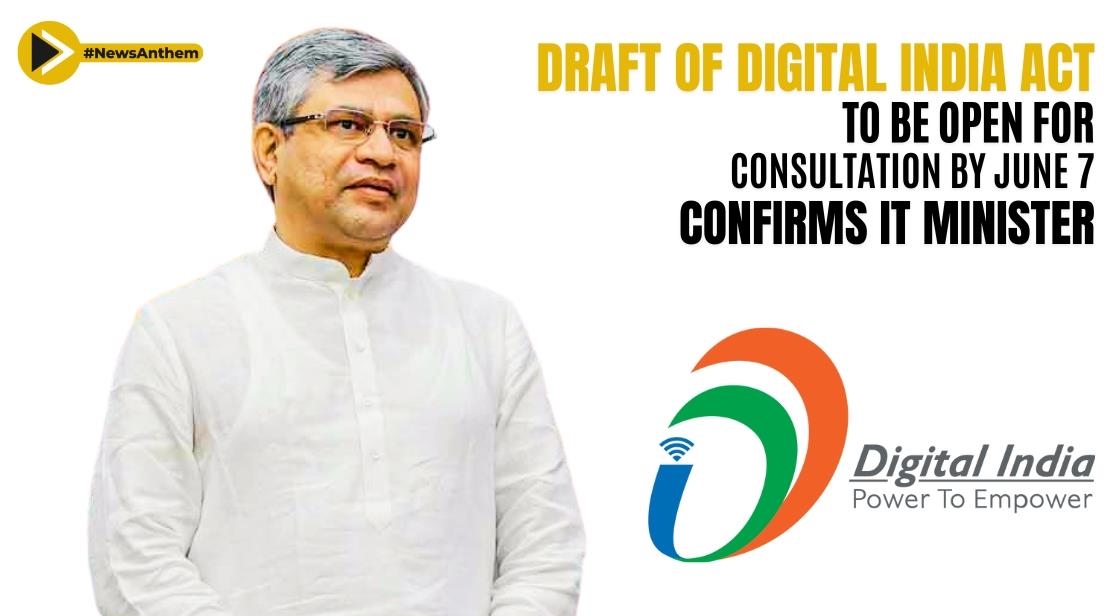Draft of Digital India Act to Be Open for Consultation by June 7, Confirms IT Minister

News Synopsis
Digital India Act Draft Open for Discussion by June 7
The first draft of the forthcoming Digital India Act (DIA) is expected to be available for consultation starting June 7, according to Minister of State for Electronics and Information Technology (MeitY) Rajeev Chandrasekhar. The DIA bill, set to replace the existing Information Technology Act of 2000, aims to regulate and safeguard users in India's rapidly expanding internet economy.
Government Aims for $1 Trillion Digital Economy by 2025-26
Earlier this year, a pre-drafting consultation for the DIA took place in Bengaluru, and another consultation is scheduled to be held in Delhi before the release of the draft bill in June. The government's objective is to achieve a digital economy surpassing $1 trillion by 2025-26.
Addressing Misinformation and High-Risk AI
In response to the escalating threat of AI-related misinformation, the Digital India Act is designed to combat misinformation and mitigate the risks associated with "high-risk AI." By addressing these concerns, the government aims to prevent harm to users and promote a safer digital environment.
Harmonizing with Global Regulations to Protect Users
Recognizing the need to balance the rapid growth of the digital economy while safeguarding user interests and preventing monopolies by tech giants, the Indian government is considering rules and regulations implemented worldwide. The intention is to align the Digital India Act with global standards and collaborate with other countries to protect users from potential harm.
Minister Chandrasekhar emphasized the importance of international cooperation, stating, "All the regulators in the world want to regulate through the prism of user harm. Countries of the world must harmonize and cooperate because victims are in one jurisdiction and the perpetrators are in some other jurisdiction." The Digital India Act will aim to harmonize with existing global rules and regulations to create a comprehensive framework.
Incorporating Punitive Measures for Data Protection
In reference to the recent record fine of 1.2 billion euros ($1.3 billion) imposed on Meta by the European Union for violating Global Data Protection Regulations on cross-border data transfers, Minister Chandrasekhar highlighted the similarities between this case and the Digital Personal Data Protection Bill, 2022.
He noted, "That is in the Digital Personal Data Protection Bill. You will see when the Parliament passes it. We have the same kind of punitive measures there as well. The Digital Data Protection Bill is going to the Parliament in July." The Digital Personal Data Protection Bill, which includes punitive measures similar to those imposed on Meta, is expected to be presented to the Parliament for approval in July.
By incorporating punitive measures, the government aims to ensure the protection of digital personal data and hold companies accountable for any violations, thereby safeguard the privacy and rights of users. The Digital Personal Data Protection Bill, 2022 is a crucial step in this direction, as it encompasses provisions to regulate the collection, storage, processing, and transfer of personal data.
With the imposition of the record fine on Meta by the European Union, the government emphasizes the need for stringent measures to safeguard data and prevent unauthorized cross-border data transfers. The Digital Personal Data Protection Bill aligns with international standards and includes punitive measures to deter companies from engaging in activities that compromise user privacy and violate data protection regulations.
Through the implementation of the Digital India Act and the Digital Personal Data Protection Bill, the government aims to establish a robust regulatory framework that promotes a secure and trustworthy digital ecosystem. These legislative initiatives not only seek to protect individual users but also aim to foster a competitive and fair digital economy.
Furthermore, the government recognizes the importance of global collaboration in addressing digital challenges and preventing jurisdictional disparities. By harmonizing the Digital India Act with global rules and regulations, India aims to promote cooperation among nations and create a cohesive approach to ensure the safety, privacy, and well-being of users across borders.
As the draft of the Digital India Act becomes open for discussion, stakeholders and experts will have the opportunity to provide their input and shape the final legislation. This inclusive approach encourages dialogue and ensures that the interests of all stakeholders, including individuals, businesses, and regulatory bodies, are taken into account.
Conclusion
The Digital India Act and the Digital Personal Data Protection Bill represent significant steps toward achieving a digital economy worth over $1 trillion by 2025-26 while prioritizing user protection and privacy. By regulating the expanding internet economy, addressing misinformation and high-risk AI, and aligning with global regulations, India aims to create a secure, inclusive, and thriving digital landscape for its citizens.
You May Like









